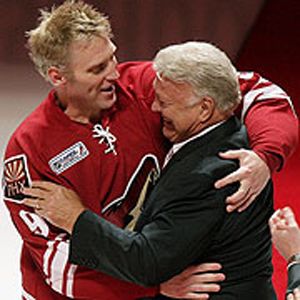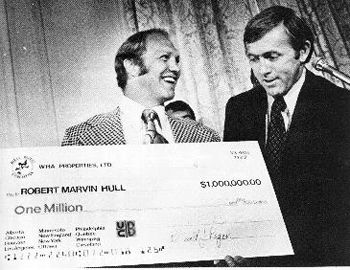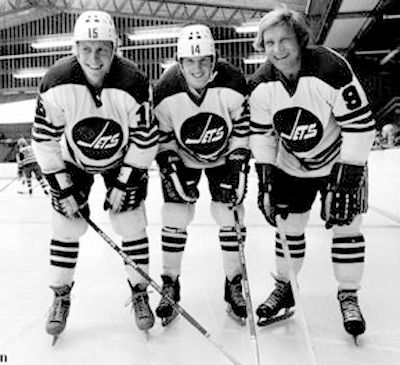On this date in 1989, the Winnipeg Jets retired Bobby Hull's jersey #9.
Hull had been a member of the Chicago Black Hawks of the NHL for fifteen seasons when the upstart World Hockey Association came looking for a star player to jump start the league and attempt to buy instant credibility, and found their man in Hull.
Coming off a 50 goal season with Chicago, when Hull jokingly told the WHA he'd jump for a million dollars, the WHA owners and league officials agreed to contribute to the cause and Hull was signed to a ten year, one million dollar contract. The WHA would not last the full ten years.
Despite an injunction filed by the Black Hawks which kept Hull out of the first 14 games of the 1972-73 season, the damage was done and eventually Hull became a full time Jet and the WHA was off and running.
Hull paid immediate dividends to the league and the Jets, raising the profile of the league and leading the Jets in scoring with 51 goals and 52 assists for 103 points, placing fourth in league scoring as the Jets finished atop the Western Division standings and leading Winnipeg to the Avco Cup Finals. Hull was also named the WHA Most Valuable Player in 1973, but it could be said that he had already earned that distinction by simply signing with the league in the first place!
For the next season, Hull was joined in the league by NHL legend Gordie Howe, who was lured out of retirement in order to play with his sons Mark and Marty in Houston with the Aeros. Hull would top his goal output with 53, but the Jets would drop in the standings and get bounced in the playoffs in four straight by Howe and the Aeros.
The Jets would respond by unleashing the most dynamic line in the history of the league the following season with the arrival of Ulf Nilsson and Anders Hedberg of Sweden.
The trio would light up scoreboards all over the league, with each player topping 100 points, led by Hull's record breaking 77 goals on his way to 142 points and being named the WHA MVP for the second time. His 77 goals were 23 more than his next closest pursuer and broke Phil Esposito's professional mark of 76 in 1970-71. Despite the offensive fireworks, the Jets would somehow fail to qualify for the WHA playoffs.
1975-76 would again see the trio of Hull (53 goals, 123 points), Nilsson (114 pts.) and Hedberg (105 pts.) all top 100 points and the Jets improve 25 points in the standings to capture the Canadian Division title. Once in the playoffs, the Jets would sweep the Edmonton Oilers in 4, oust the Calgary Cowboys in 5 and sweep the Aeros in 4 to capture their first WHA championship and the Avco World Trophy.
Hull was limited to just 34 games of the 1976-77 regular season, scoring 53 points in those games. Nilsson, Hedberg and the remainder of the Jets played well enough in Hull's absence to qualify for the playoffs, and Hull contributed 22 points in 20 games as the Jets returned to the finals to defend their title but lost in seven games to the Quebec Nordiques.
Hull would come roaring back the following season of 1977-78 with a 117 point campaign that included 46 goals as the Jets finished in first place during the regular season of the now failing WHA, which was down to one division of seven clubs after having 12 in the league in the previous season.
The Jets would defeat the Birmingham Bulls in five games to advance to the finals where they would demolish the New England Whalers in four straight games by outscoring the Whalers 24 goals to just 8 to capture their second championship.
Hull was limited to only four games in 1978-79 and played 18 games for the Jets in 1979-80 after their absorption into the NHL before being traded to the Hartford Whalers where he was teamed with Gordie Howe for the final nine games of his career.
Hull would finish his WHA career with 411 games played, 303 goals and 335 assists for 638 points (in essentially six full seasons) and two championships and second in league history for goals scored and third in points.
The Jets would play in the NHL from 1979 to 1996 before relocating to Phoenix, Arizona. Years later his son Brett would be signed by the Coyotes, who un-retired Bobby's #9 so Brett could wear his father's number. Coming after a year off following the NHL lockout season in 2004-05, Hull was no longer up to the task and retired after only playing five games, whereupon #9 was retired once more.

Today's featured jersey is a 1972-73 Winnipeg Jets Bobby Hull jersey as worn by Hull during the Jets inaugural WHA season. Their first set of jerseys were notable for both they short-lived original crest and their contrasting nameplates, the blue jerseys having white nameplates with red lettering and the white jerseys sporting red nameplates with white letters, both in an unusual, almost handwritten, font.
For the second season the Jets adopted their more familiar round logo, which survived not only the entire lifespan of the WHA, but also lasting until the 1989-90 NHL season before undergoing a very effective modernization.
Our first video is a real treat, highlights of a 1972-73 Winnipeg Jets game against the Chicago Cougars, in which Hull scores goals 50 and 51. Take note of the Jets first season uniforms with the original Jets wordmark, rather than the familiar round logo they would adopt in time for their second season, and the white nameplates with red lettering.
Fast forward to 1975 as Hull, now teamed with Hedberg and Nilsson, scores twice against the Aeros.
Finally, here is an interview with Hull on the occasion of the Jets retiring his jersey #9 in 1989.








No comments:
Post a Comment
We welcome and encourage genuine comments and corrections from our readers. Please no spam. It will not be approved and never seen.